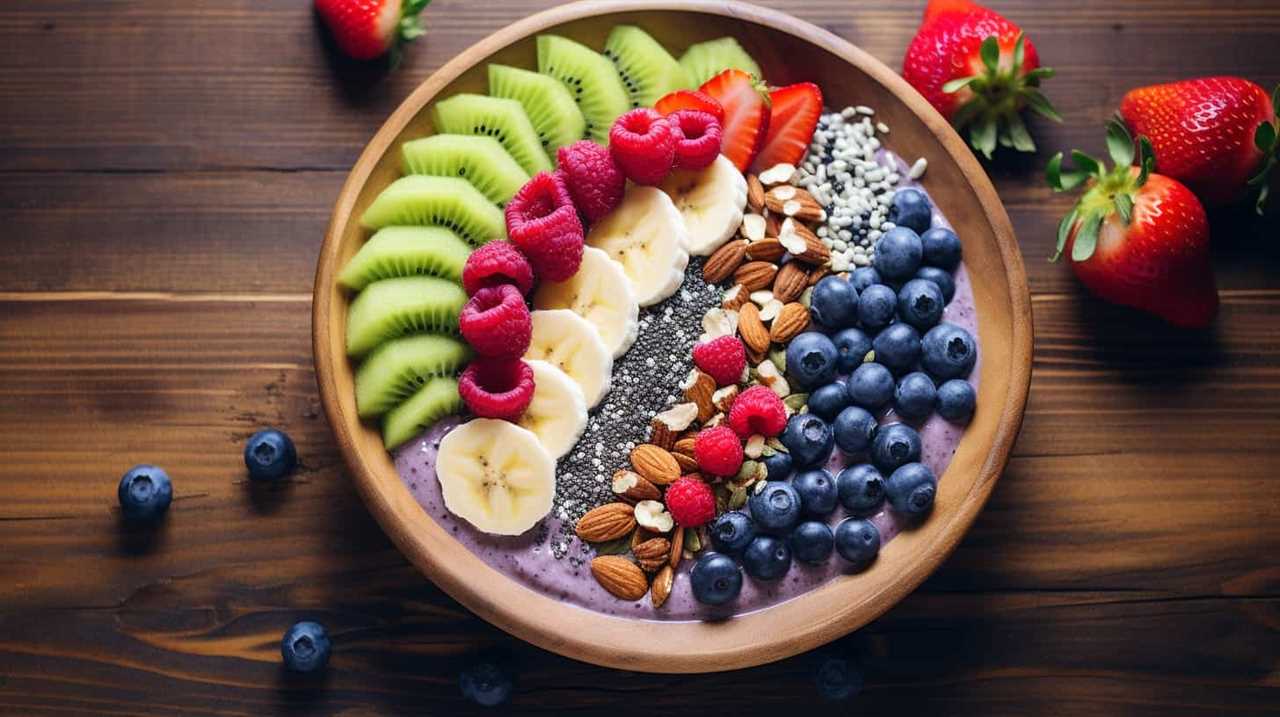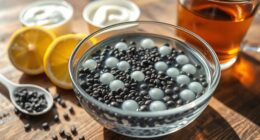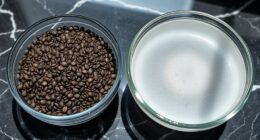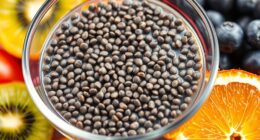We’ve discovered an authentic triple threat for your plant-based diet: chia seeds.
Did you know that just one ounce of these tiny seeds contains a whopping 4 grams of protein?
Not only that, they’re also packed with omega-3 fatty acids, fiber, antioxidants, and vitamins.
Whether you’re looking to boost your nutrient intake or add some variety to your plant-based meals, chia seeds are a must-have ingredient.
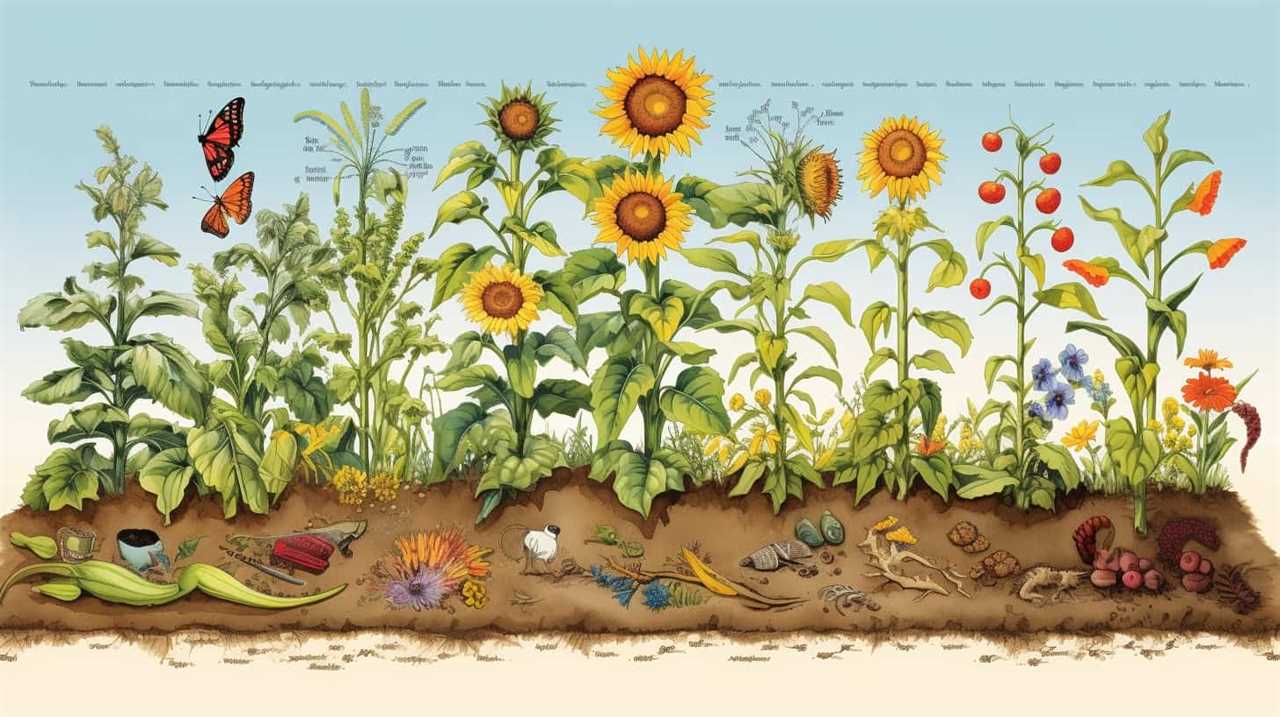
Let’s delve into the benefits and ways to incorporate them into your diet.
Key Takeaways
- Chia seeds are packed with essential nutrients such as omega-3 fatty acids, fiber, antioxidants, protein, calcium, and magnesium.
- They provide numerous health benefits, including supporting heart health, weight management, blood sugar regulation, digestion, and brain function.
- Chia seeds can be easily incorporated into a vegan diet by adding them to smoothies, using them as an egg substitute, or making chia seed pudding.
- When buying and storing chia seeds, it is important to choose organic and non-GMO options, check expiration dates, store them properly, and use airtight containers.
Essential Nutrients in Chia Seeds
Chia seeds pack a punch when it comes to essential nutrients, providing vegans with a powerhouse of plant-based goodness. These tiny seeds are loaded with nutritional benefits that contribute to overall health.
Chia seeds are an excellent source of omega-3 fatty acids, which are essential for brain health and reducing inflammation in the body. They also contain high amounts of fiber, which aids in digestion and promotes a feeling of fullness.
Chia seeds are rich in antioxidants, such as flavonoids and phenolic compounds, which help protect our cells from damage caused by free radicals. Additionally, they’re a great source of protein, calcium, and magnesium, all of which are important for maintaining strong bones and muscle function.
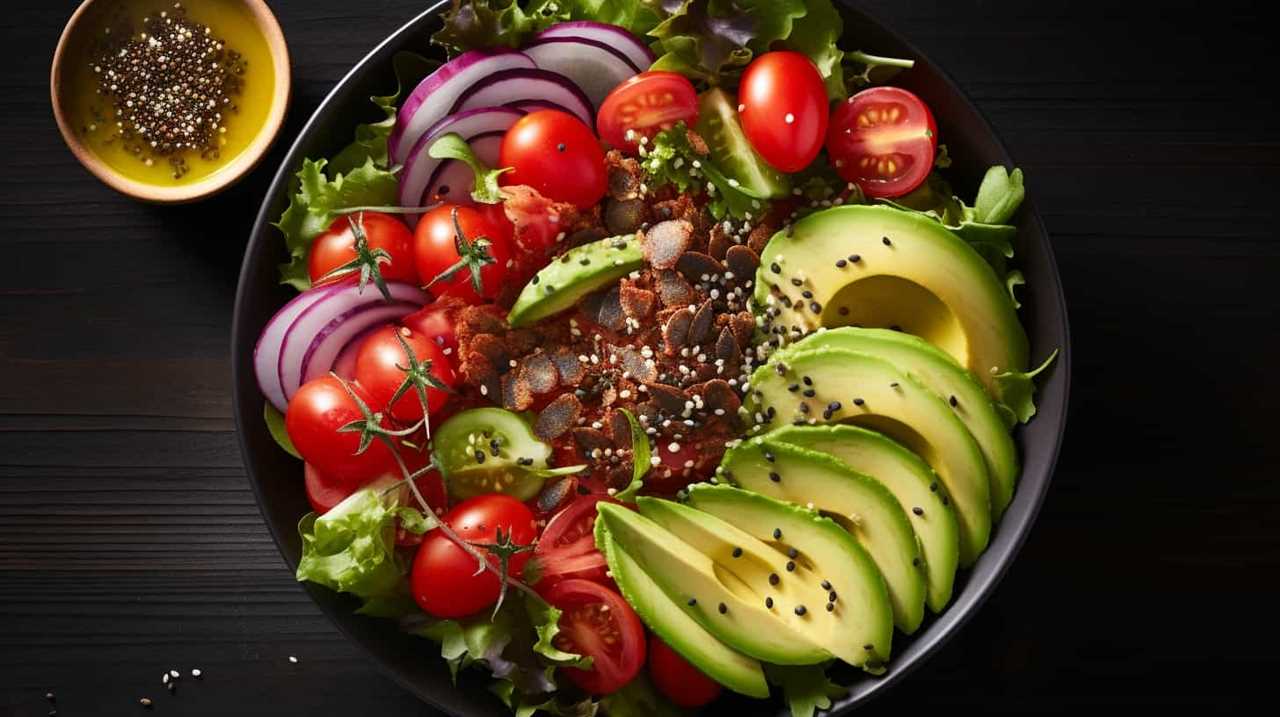
Including chia seeds in your diet is a simple and effective way to boost your overall health.
Protein Powerhouse for Vegans
Continuing our exploration of chia seeds as a nutrient powerhouse for vegans, let’s delve into their role as a protein powerhouse.
Chia seeds are an excellent source of plant-based protein, making them an ideal addition to the diet of vegetarians and vegans. Here are three reasons why chia seeds are a great protein source for vegetarians:
-
High protein content: Chia seeds contain about 14% protein by weight, making them one of the richest plant-based sources of protein available.

-
Complete amino acid profile: Chia seeds provide all nine essential amino acids, which are required for the body’s optimal functioning and muscle recovery.
-
Enhanced athletic performance: The protein in chia seeds helps repair and build muscle tissue, which can improve athletic performance and aid in post-workout recovery.
Incorporating chia seeds into your diet can provide the protein your body needs, whether you’re an athlete or simply looking to increase your protein intake as a vegetarian or vegan.
Omega-3 Fatty Acids in Chia Seeds
As we explore the nutrient powerhouse of chia seeds for vegans, we now turn our attention to the omega-3 fatty acids found in this remarkable superfood.

Omega-3 fatty acids are essential fats that play a crucial role in our overall health. They’ve been shown to reduce inflammation, support heart health, and promote brain function.
Chia seeds are a great plant-based source of omega-3s, making them an excellent addition to a vegan diet. Just one ounce of chia seeds contains about 4,915 mg of omega-3 fatty acids.
To incorporate chia seeds into your vegan diet, you can sprinkle them on your morning cereal, blend them into smoothies, or use them as an egg substitute in baking.
Now that we’ve covered the benefits of omega-3 fatty acids in chia seeds, let’s move on to the next section about the fiber boost for a plant-based diet.
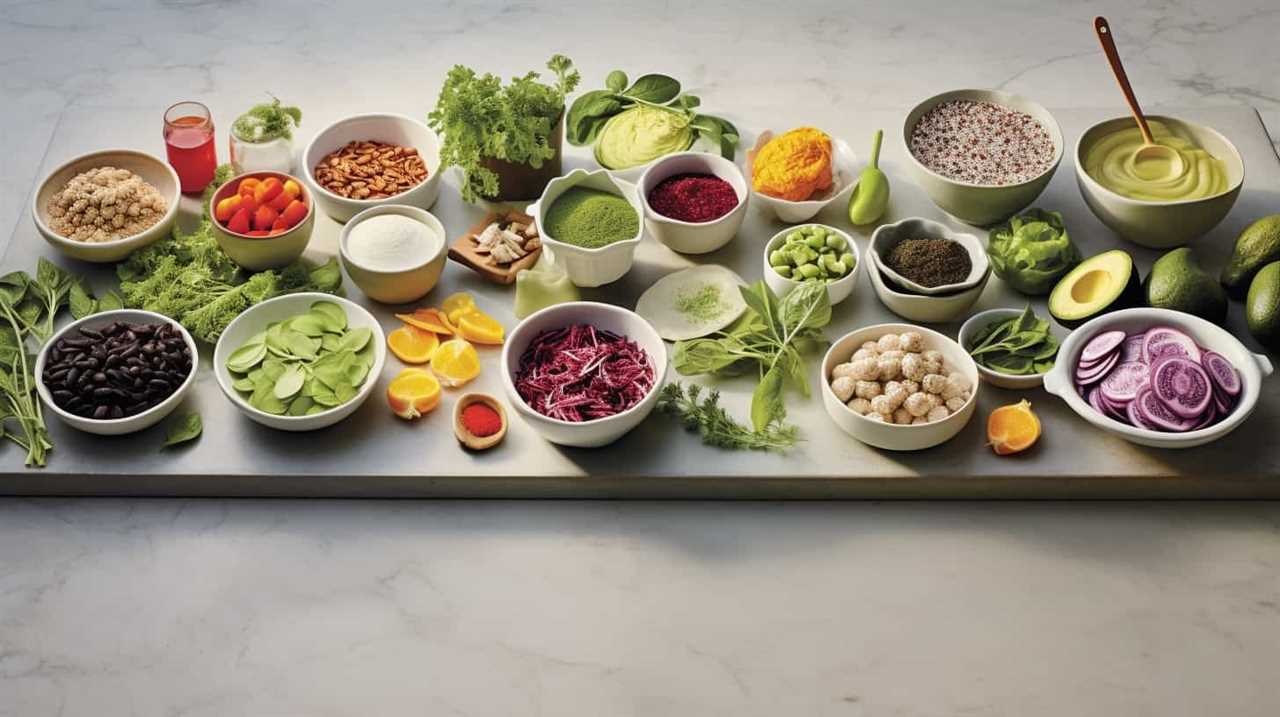
Fiber Boost for a Plant-Based Diet
To maintain a healthy plant-based diet, incorporating a high-fiber source, like chia seeds, is essential for optimal digestion and overall wellness. Chia seeds are a fantastic addition to plant-based recipes as they provide a significant fiber boost.
Here are three reasons why chia seeds can be a game-changer for your fiber intake:
-
Chia seeds are packed with soluble fiber, which helps to regulate blood sugar levels and reduce cholesterol. This can be particularly beneficial for individuals with diabetes or heart disease.
-
The insoluble fiber in chia seeds acts as a natural laxative, promoting regular bowel movements and preventing constipation. This is crucial for maintaining a healthy digestive system.

-
Chia seeds can aid in weight loss by promoting a feeling of fullness and reducing appetite. The high fiber content helps to control cravings and prevent overeating.
Incorporating chia seeds into your plant-based diet can provide a much-needed fiber boost, supporting your overall health and wellness goals.
Antioxidants and Vitamins in Chia Seeds
Our exploration of the nutrient power of chia seeds continues with a focus on the antioxidants and vitamins they offer.
Chia seeds are rich in antioxidants, which help protect our cells from damage caused by harmful free radicals. These antioxidants, such as quercetin and chlorogenic acid, have been linked to a reduced risk of chronic diseases like heart disease and cancer. In fact, chia seeds have been found to contain more antioxidants than many other plant-based foods, including blueberries and spinach.
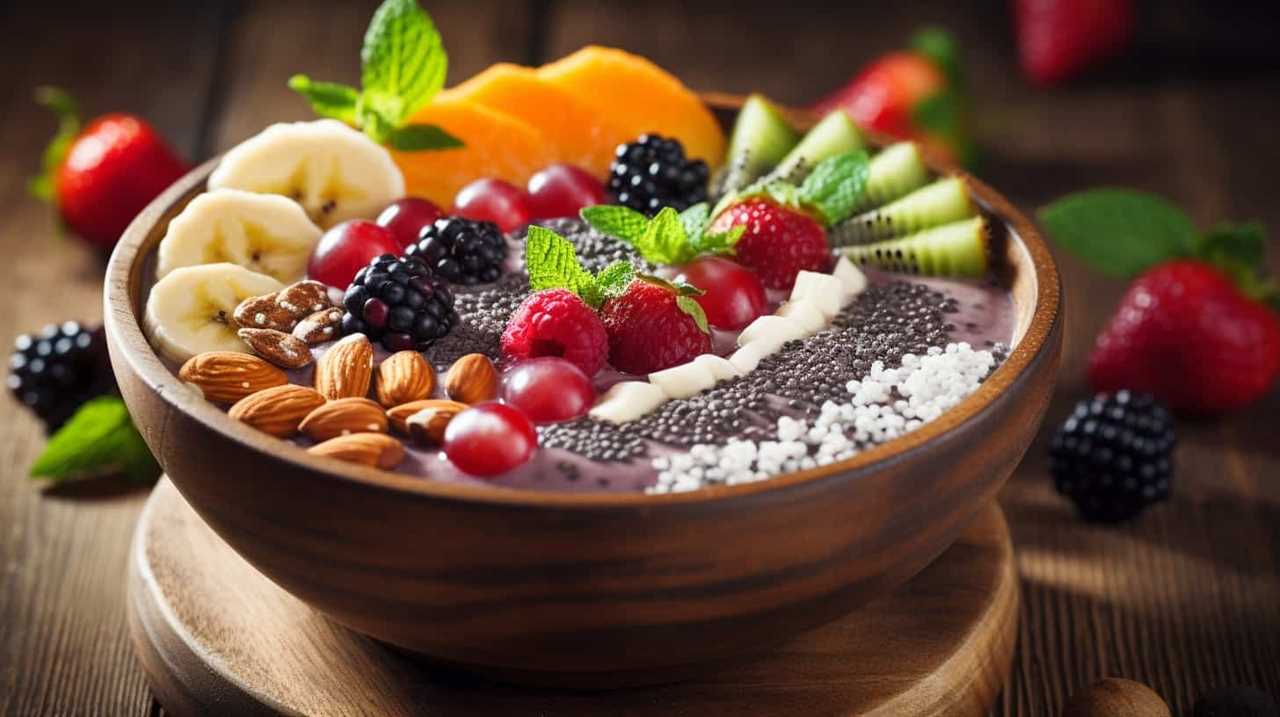
In addition to their antioxidant benefits, chia seeds are also packed with vitamins. They’re a great source of vitamin E, which is important for healthy skin and immune function. Chia seeds also contain B vitamins, including thiamine, riboflavin, and niacin, which play a crucial role in energy production and brain function.
To maximize the antioxidant benefits and vitamin content of chia seeds, it’s recommended to consume them in their whole form rather than ground or processed. Adding chia seeds to your diet is a simple way to boost your antioxidant intake and ensure you’re getting essential vitamins to support your overall health and well-being.
Frequently Asked Questions
Are Chia Seeds Safe for People With Nut Allergies?
Chia seeds can be a safe nut alternative for people with allergies. They are packed with nutrients and can be used in various nut-free recipes. Incorporating chia seeds into your diet can provide a healthy source of protein, fiber, and omega-3 fatty acids.
Can Chia Seeds Help With Weight Loss?
Chia seeds offer several weight management benefits, making them a valuable addition to a vegan diet. High in fiber and protein, they promote satiety and help regulate blood sugar levels, aiding in weight loss efforts.

How Should Chia Seeds Be Stored to Maintain Their Freshness?
To maintain freshness, store chia seeds in an airtight container in a cool, dark place. Follow best practices by keeping an eye on the shelf life and exploring container options. Preserve their nutrient power by being mindful of storage conditions.
Can Chia Seeds Be Eaten Raw, or Do They Need to Be Cooked?
Chia seeds can be eaten raw or cooked, but soaking them before consumption offers benefits such as improved digestion and nutrient absorption. Incorporate chia seeds into daily meals and snacks by adding them to smoothies, yogurt, or baking recipes.
Are Chia Seeds Suitable for Individuals With Gluten Intolerance or Celiac Disease?
Chia seeds are suitable for individuals with gluten intolerance or celiac disease. They are a nutrient powerhouse, aiding digestive health and blood sugar control. Incorporating chia seeds into your diet can be beneficial.
Conclusion
In conclusion, chia seeds are an authentic trio of nutrients for vegans, providing a protein powerhouse, omega-3 fatty acids, and a fiber boost.
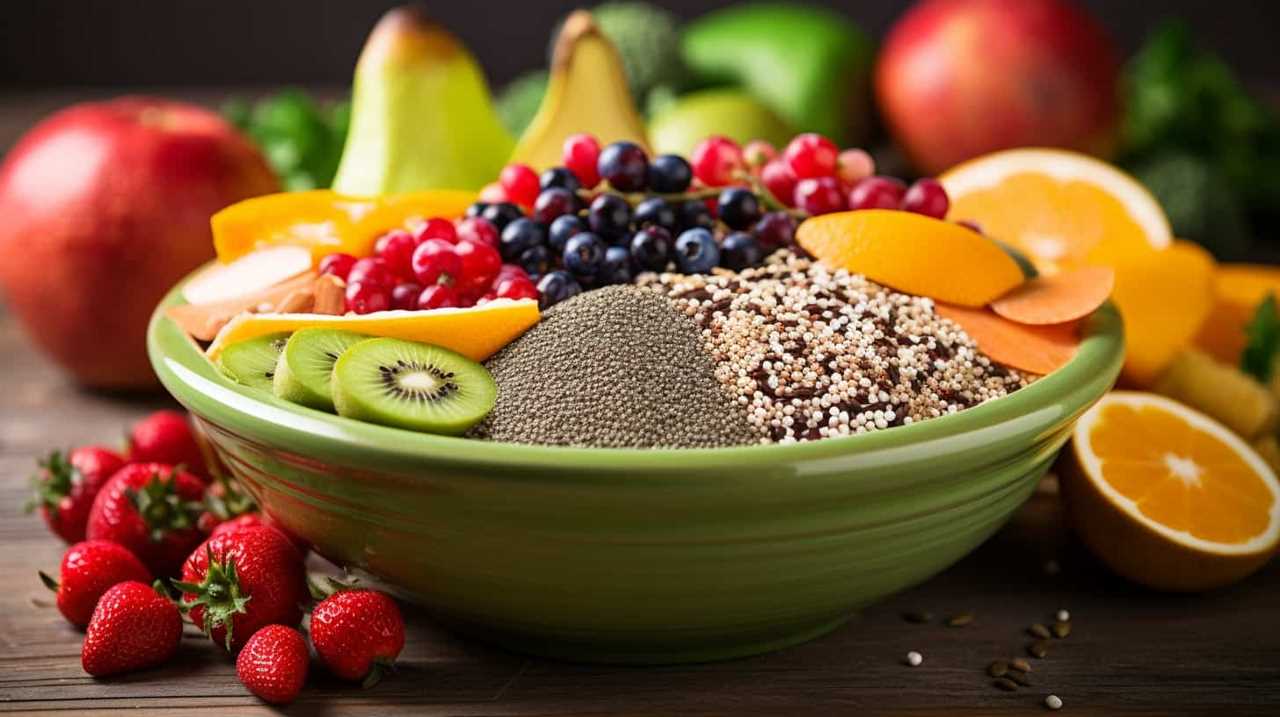
These tiny seeds also pack a punch with antioxidants and vitamins, making them a practical addition to any plant-based diet.
So, seize the opportunity to sprinkle some chia seeds into your meals and enjoy the nourishing benefits they offer.
It’s time to embrace the nutrient-packed power of chia seeds!





